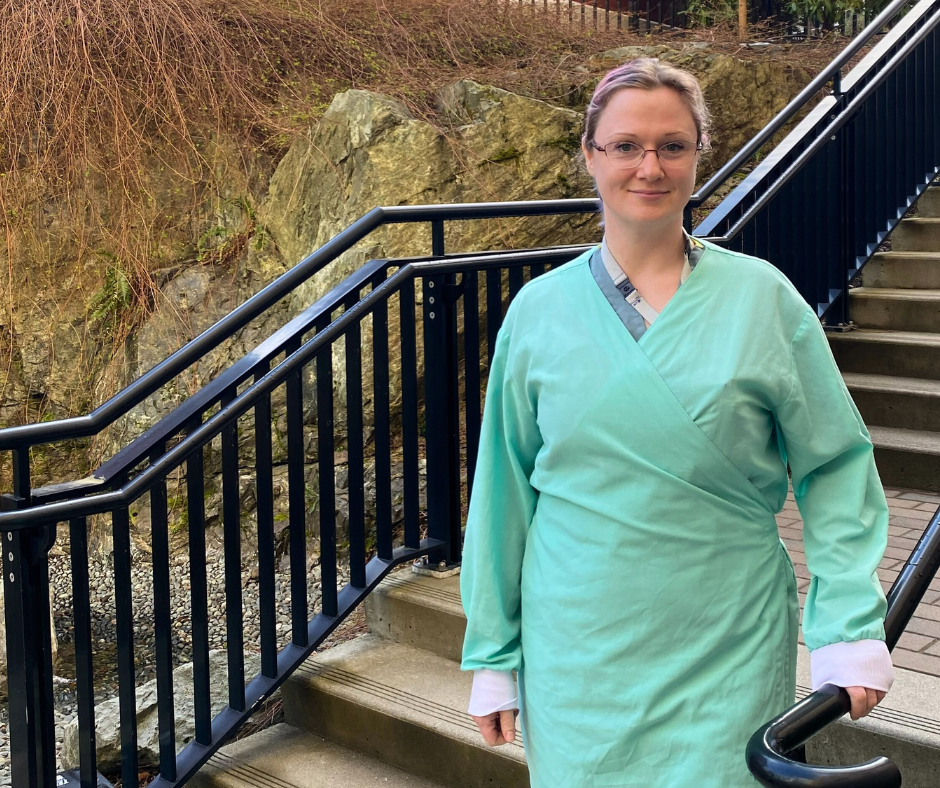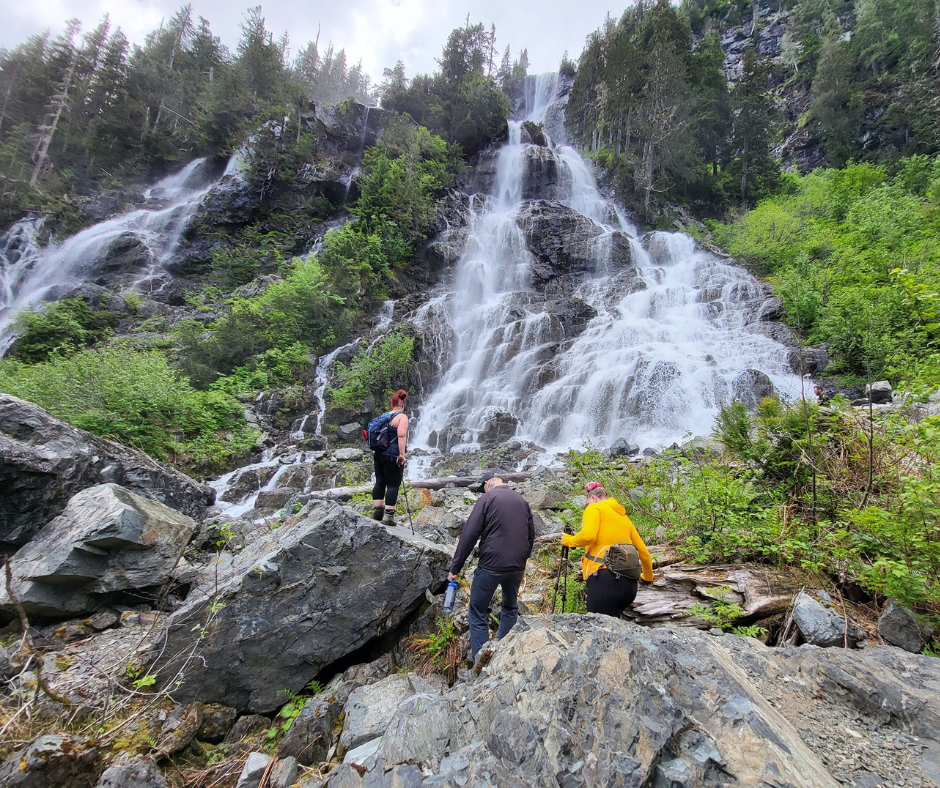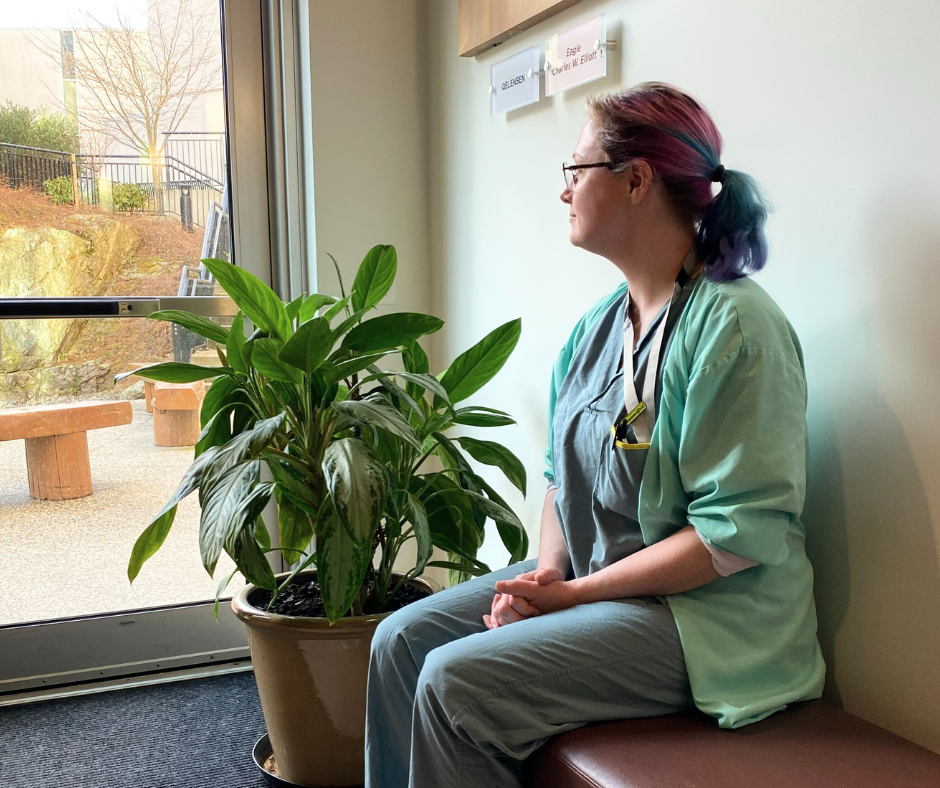
Shaunna Downey:
Registered Nurse and Clinical Nurse Educator, Operating Room, Royal Jubilee Hospital; nature and board game enthusiast, friend, sister, human
I was a high school dropout, and I worked as a cook for 12 years. When I was transitioning out of cooking, I didn’t know what I wanted my next steps to be, and I started working at a video store. I worked for this man who had become a father figure, and he told me I was on completely the wrong path. He let me alter my work schedule so that I could go back to school and upgrade.
I did four years of upgrading, and during that process I found psychology and biology to be super interesting. A lot of people had also paid me kindness on my path to help me get to a good spot. I wanted to pay that forward, which was one of the reasons I chose nursing.
I knew I wanted to be in the operating room since I was 16 years old, when I was still a young cook. I would watch surgeries on TV, and I thought that was the coolest skill. In my second year of nursing school in Nanaimo, I watched a patient surgery and just about passed out. But I was really attracted to the high drama and excitement, and also the routine and regiment of surgery, and the team dynamic. There was just something in me that felt called to do this work that everyone else squirms about.
We all have our moments that still make us go kind of woozy. But I get over those moments through genuine curiosity for what we’re doing, and knowing that our actions will help somebody’s outcome down the road.
Clinical Nurse Educators participate in the delivery of education, and monitor and evaluate students as they grow through different stages of their learning. We help them with their learning plans, goal setting, and personal and professional evolution. The educator also seems to be a sort of catchall role to help find the pathways for issues and concerns to be dealt with. Essentially, we’re facilitators, mediators, and peacekeepers.
The most meaningful part of this work is watching staff grow, watching those “Aha!” moments, and watching people really embrace their work over time. I love when students come for observations and leave wide-eyed and inspired, the same way I did.
“I knew I wanted to be in the operating room since I was 16 years old, when I was still a young cook. I would watch surgeries on TV, and I thought that was the coolest skill.”
“There’s part of me that enjoys an urban aspect, but there’s a part of me that will always be that little kid from Port Alberni in a feral childhood who wants to go play in the woods and be adventurous.”
I promised myself when I graduated that I would work with a wellness model as well as an illness model. The other day we were on Mount Finlayson and I was just absorbing all of that green, that moss, that beautiful backyard we have. It’s so healing. It just fills my cup to come back to places where I see people around the community who are healthy and thriving. Otherwise, I think it’s really easy to form a narrow worldview where everyone is ill. Working in the OR, sometimes I wonder how there are people in the community who still have gallbladders.
I also love board games. On an ideal day off, my friends and I would go to drag brunch and then to a board game café, with a nice long walk in their somewhere too. There’s part of me that enjoys an urban aspect, but there’s a part of me that will always be that little kid from Port Alberni in a feral childhood who wants to go play in the woods and be adventurous.
If I could go back, I’d pace myself more to manage my own burnout and compassion fatigue. I’m trying to have more of that work-life balance, and get back to my friends who have supported me. I realized I’m missing out on their kids growing up. So, I’m coming back and re-establishing those relationships and putting life first, instead of my career. But that’s hard because my career has been there for me since day one.
When staff present to me and say they’re having issues A, B, and C in their personal lives, I’ll ask them if work is a helpful distraction or if they need time off. I’ll ask: What does support look like to you? What do you need? Do you want me to be an advocate for you so you can take a day off? Or do you want to be here?
I’m very about our feelings. Even when talking to students about stress, I tell them to notice how it shows up in the body first. Maybe you get little butterflies in your stomach, or your cheeks get warm and flushed. It’s about learning to recognize what happens before we completely shut down—because our bodies give us signals along the way. We learn to listen so that we can intervene sooner.
I feel like my whole life has been trauma, and that’s also geared me towards working in a trauma-based environment. When I was in my fourth year of university, my estranged father’s house sort of blew up. It was an accident. It took two years to get a death certificate, and then trying to clean up the site and minimize the impacts to the external environment. I think that brought up a lot of family dynamics. My dad was in jail when I was younger—he wasn’t an active part in our lives. It was particularly hard on a lot of my siblings. And, on a personal level, it’s now hard for me to connect with other families in a wholesome way, because I wasn’t raised with that. I think there’s always just been this deep sense of loss.
The greatest piece of advice I ever got was from the book Daring Greatly by Brené Brown. It’s the idea that it’s not the critic who counts—and I have a really harsh inner critic—but the courage to go after things and pursue life with reckless abandon and total love and drive for what we need to do. We’re here only once, and if we do it right, once is enough. So, go out into the arena, and only take your feedback from people who are in the arena with you, instead of the people watching from the stands.
We make up all of these stories about who we have to be and how we should act. Of course, we still want to be kind and respectful, but we can also still be ourselves through that process. I want to be one of those people who shows up authentically loud, imperfect, and just totally who I am—and to be a beacon for other people to show up that way, too.
“The greatest piece of advice I ever got was from the book Daring Greatly by Brené Brown. It’s the idea that it’s not the critic who counts—and I have a really harsh inner critic—but the courage to go after things and pursue life with reckless abandon and total love and drive for what we need to do.”
They are humans first, who put other humans first.
More than 8,900 caregivers and staff work around the clock in our Victoria Hospitals
#HumansFirst is dedicated to sharing the stories from behind our hospitals’ frontlines. These stories remind us that those who provide care and keep the lights on in our hospitals also have lives outside of them. They have family and friends, they enjoy hobbies and interests, and they have all lived through their own personal triumphs and heartbreaks. Like all of us, they are human, and they have a story to tell.







